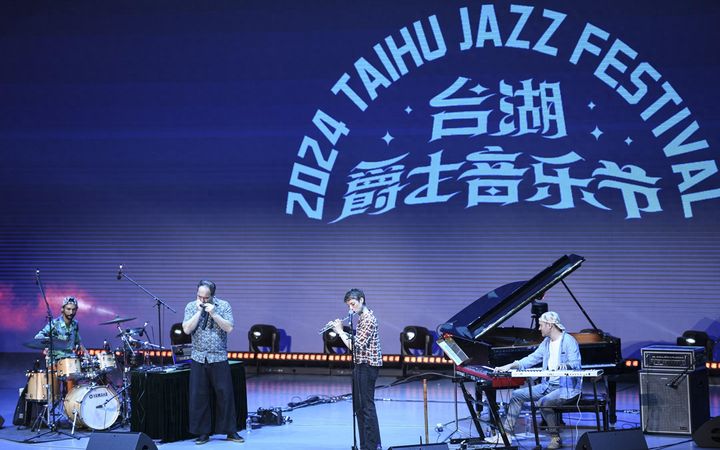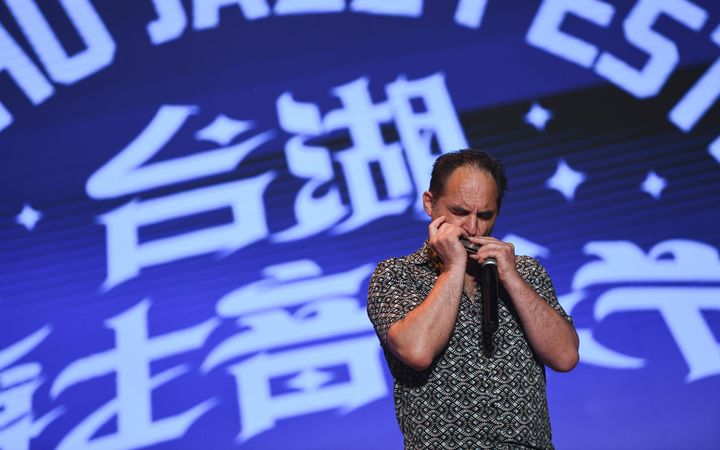
As night falls, the breeze blows slowly and the music sounds melodious. On the stage of the Taihu Stage Art Center of the National Center for the Performing Arts in Tongzhou District, Beijing, French harmonica player Laurent More and his band are giving a wonderful jazz quartet performance to the audience.
In the Taihu Amphitheater, music fans took their seats and listened attentively, while the lights and shadows on the surrounding building walls changed. Moore was concentrating on playing, with the harmonica moving quickly around his mouth and his fingers constantly jumping. The sound of the harmonica freely echoed with the flute, piano and jazz drums next to him, either passionately or lightly, hovering and intertwined over the theater. After the song, Moore greeted the Chinese audience in simple Chinese and bowed to the audience with his band. The audience received thunderous applause.
See Also: 2024 Taihu Jazz Festival
“Music has an incredible power that allows people from different countries to appreciate each other across language barriers. This ‘superpower’ helps different countries and civilizations understand each other,” Moore said.
More, who was born in Paris, France in 1970, has won many international harmonica competition awards and has performed all over the world for decades. This time he came to perform as a special guest at the 2024 Taihu Jazz Festival.

The 2024 Taihu Jazz Festival hosted by the National Center for the Performing Arts has attracted widespread attention from music fans in recent days. More than 200 Chinese and foreign jazz musicians from China, France, Hungary, Cuba and other places presented more than 50 jazz performances to the audience at the Taihu Stage Art Center.
Moore has a deep relationship with China and has visited China many times for performances and exchanges. Talking about this beautiful “encounter”, he said, “This is more like a ‘Chinese dream'”.
Affected by the financial crisis in 2008, Mohr, who originally performed in a French restaurant, lost his job when the restaurant closed down. He learned that some musicians were doing well in China, and with the encouragement of friends, he came to China in 2010. “When I first arrived in China, I was not used to it because of the cultural differences.” Moore said frankly. However, he quickly found a sense of belonging.
“For jazz, no matter where in the world, as long as everyone plays together, they will immediately find a connection and become friends, even if you don’t understand the local language and culture. Music can convey a lot of things, which is great.” He said .
In this way, Moore met many musicians in China. Since then, he often traveled back and forth between China and France, performing in different places, and even spent the Spring Festival in China. In 2018, he visited 24 cities in China including Xi’an, Wuhan, and Guangzhou during a 28-day tour. Whether it was a small club or a big theater, he enjoyed it all. He was “deeply impressed” by China’s vast territory, abundant resources, rich food, and regional differences.
Moore bluntly said that when he was a child, his understanding of China basically came from martial arts movies. It was only after he actually came to China that he discovered that Chinese friends were “very generous and open.”
His experiences in China, the Chinese friends he made, and Chinese traditional music all provided constant nourishment for Moore’s music creation. He studied Chinese musical scores and drew inspiration from Chinese music, adding some Chinese elements into his arrangements, and “friendship” became a theme he often expressed in his music.
Moore was pleased to say that with the vigorous development of jazz education in recent years, jazz has become increasingly international, and the fan base has also undergone great changes. More and more young people like or play jazz. “For example, when performing in China, young audiences are very enthusiastic and engaged. Chinese jazz musicians will also add Chinese colors to their performances, which is very interesting.” He said.
This year marks the 60th anniversary of the establishment of diplomatic relations between China and France. In Moore’s view, music plays a vital role in promoting cultural exchanges between China and France. “For example, I can only speak relatively simple Chinese, but when I listen to Chinese classical music, I will still be deeply moved, because the music itself is beautiful. As long as musicians create good works with heart, music can play a role in promoting The role of people-to-people bonds.”
“Jazz shows more of a state of mind, and I try to use music to talk to everyone.” At the end of this “musical journey” in Beijing, Moore said sincerely, “I hope that my Chinese friends and audiences People can like and enjoy my music, forget their worries, immerse themselves in it, and spend a good time together in the music.”